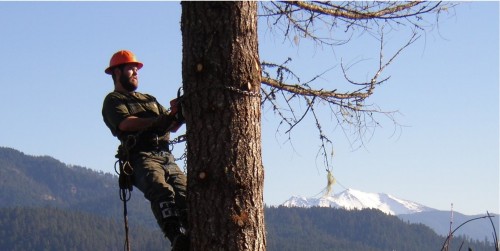This article really humbled me, for a few simple reasons.
I gained a real appreciation for some of the very hard work that people do across the world, in this case in the States, to make a living. At times I think I’ve worked pretty hard in my life. And then I read an article like this, and I think I hardly know the meaning of hard work.
I was really enamored to read about how someone finds their passion, a calling and love for a certain job, in an industry where you wouldn’t think of it as an industry of passion (the article is about logging, which I am sure for some is a controversial subject–but unless you live in a Yurt or Tent, then the reality is you probably live in a structure that somehow ties back to the logging industry). Sure, there are jobs out there–in any Company and industry–where people are just punching a clock. But, then, there are those certain people who have a passion for what they do (these people are the “magic” in an organization).
And, as it turns out, this includes the logging industry.
This story also reminded me of a few other things personally.
In the Fall of 2000 I was working as an Exec at a start-up company in Manhattan. It was an incredible job and opportunity, but the hours and intensity were pretty brutal, I can’t quite describe it and unless you’ve been in that environment you can’t understand it. During the week I rarely got home before midnight (maybe one night a week, two if I was lucky) and it was pretty normal to get home in the middle of the night or early morning. Yet, I loved it and it was one of the best jobs I’ve ever had. But with every job there’s a bit of “downside” and the time required for this job was one of them.
Then one day I was feeling a bit fatigued, and was probably even pining a bit to myself about the magnitude of our task, and that same day I stumbled onto a Wall Street Journal article. It told the story about two Chinese citizens living in the rural countryside, and the amount of work they had to do daily just to earn enough to afford a shanty for their family along with simple rice and chicken as food. Above the story there was an oversized picture of these two men working; I remember one guy was 67 years old. He looked 80. And the work in the rice fields appeared backbreaking. And there was no future, for them it just looked so hopeless. Even though it was a sterile B&W photo from 10,000 miles away in an environment I’m unfamiliar with, their exhaustion poured off of the page I was holding in my hands. That day I took that picture and posted it on my wall at work (and have kept it ever since) as a reminder of the privilege I have been given.
The story below reminds me a bit of that article from nearly a decade ago, and it gave me a new appreciation for the hard work that goes on across the world, and also the passion that people can find within it.
In “Brush Cat,” Jack McEnany offers a vivid account of the “wood economy” of New Hampshire, never stinting on the danger in this line of work. “According to the U.S. Department of Labor,” Mr. McEnany writes, logging is “the most dangerous job in America,” handily beating out the number-two killer profession, commercial fishing.
So why do it? What, to use a term from Econ 101, are the incentives? Looking for an answer to that question, Mr. McEnany spent some serious time with loggers — both in the woods and in the bars where they restore themselves at the end of the day. The answer turns out to be simple — they do it because they love it. Why they love it is a little harder to figure out.
Click here to read the full story.
No doubts, take Lasix only as prescribed by your physician. Levitra is one of the best-known medications of all time. What is the most significant info you must study about levitra vs cialis? Most doctors say the effectiveness of Levitra is well documented. Absolutely, a sexual problem refers to a problem during any phase of the sexual response cycle that prevents the individual from experiencing satisfaction from the sexual life. Whilst sex is not vital for good soundness, it�s doubtless significant for anyone. Why it happen? What kinds of professionals treat sexual diseases in men? A common class of antidepressants, which include Zoloft � can kill the mood in bedroom.

